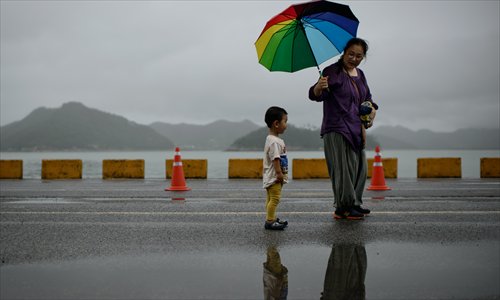HOME >> WORLD
Enduring the unendurable
Source:AFP Published: 2014-7-14 23:33:01
Families of missing Korean ferry victims continue vigil for lost loved ones

A woman and a child walk on July 6, 2014, in Jindo harbor, where families of the victims of the Sewol ferry still unaccounted for continue to wait. Photo: AFP
When steel worker Huh Hong-hwan heard his teenaged daughter might be trapped in a sinking ferry, he didn't hesitate.
He jumped in his car and drove, sick with anxiety and panic, for five hours down to the southern island of Jindo, where the rescue operation for South Korea's worst peacetime disaster was gearing up.
Nearly three months later, he's still there.
"I never thought I would be waiting for her this long," the 50-year-old said at a gymnasium that has been his home since the 6,825-ton Sewol ferry capsized on April 16 with 476 passengers and crew.
"I'm totally exhausted, but parents can't give up on their children even if the whole world does," Huh told AFP.
He is one of about 30 relatives who have maintained a vigil in Jindo, as divers continue a dangerous search for the last remaining bodies trapped in the sunken vessel.
Just over 300 people died, the vast majority high school students on an organized outing.
A total of 172 were rescued before the ferry sank and a massive recovery effort involving hundreds of divers working in near zero visibility has since retrieved 293 bodies.
But 11 victims - including Huh's daughter - are still unaccounted for.
Any hope of finding survivors inside the upturned vessel vanished within days of the accident, but the families of those missing are refusing to give up the search for a body they can bury and grieve over.
Life in limbo
The last body to be recovered was more than two weeks ago on June 24 and there is no guarantee that the 11 missing are even inside the ferry.
Several bodies have been picked up dozens of miles away, suggesting a significant number may have been pulled out to sea by the powerful currents.
The 11 include five high school students and two teachers, one crew member and three other passengers.
In order to maintain a full-time vigil, some family members have quit their jobs and the lonely wait has taken a physical and mental toll.
In the immediate aftermath of the sinking, the Jindo gymnasium had resembled a refugee camp, packed with distraught relatives and a small army of volunteers helping to feed and comfort them.
But now the place is nearly empty and the default setting is of absolute silence, bar the muffled sound from a giant TV screen.
There is nothing for the exhausted-looking family members to do, beyond sitting or walking aimlessly around the echoing gym.
Some stroll outside to smoke, through glass doors adorned with hundreds of wrenching post-it messages written by families and volunteers.
"My son, today is already May 16. Please come out of the cold water. Let's go home with mom and dad," one message read.
Endless waiting
The volunteers, who once numbered in their thousands, are now down to around 200, working in shifts to provide what help they can to the remaining families.
"I never imagined the simple act of waiting could be this painful," said Kwon Oh-bok, a 59-year-old who lost a younger brother, a sister-in-law and a six-year-old nephew in the disaster.
Like Huh, Kwon drove to Jindo on the day of the sinking and he hasn't left since, leaving his electrical business shuttered.
"I'm so worried I'll be the last one left," he said, echoing a fear shared by many of the remaining relatives.
Kwon bristled at the idea of giving up, and said any move to call time on the recovery effort would feel like a death sentence.
"No one would give up if they were in my shoes," he said, urging the government to step up search operations.
In the first few weeks, dozens of bodies were being brought up, but only five were recovered in the entire month of June. Two divers have died and many others have had to be replaced because of sickness or exhaustion.
Time to move on
South Korean President Park Geun-hye had initially promised that search operations would continue as long as the families wanted.
Park's previously high ratings have plunged amid intense criticism of her administration's response to the disaster and there is little likelihood that she will go back on her vow anytime soon.
Anti-establishment anger is still running very high, and the greed, corruption and incompetence that led to the tragedy are repeatedly being highlighted at the ongoing trials of the captain, the crew and the ferry operators. Some of the relatives still in Jindo spend much of their time at the island's Paengmok harbor - the closest they can physically get on land to the recovery site.
"Please let everyone, to the last missing one, return to their families," reads one large banner attached to a fence, along with hundreds of yellow ribbons.
"Three months is a long time, but for these families, their lives seem to be completely frozen in time," said Lee Seong-tae, a volunteer who has been at the site since the beginning.
"It's as if no days have passed since April 16, and it will remain that way until they can go home with a body," Lee said.
Although Huh insists he will never give up, he admits to moments of doubt when he fears his daughter's remains have been lost for good.
"I can see hope is waning ... but can't say that openly with the other parents," he said.
"People say we should move on. But how do we do that?" he asked.
"How could any parent do that after their children suffered such a death and their bodies are trapped in dark, cold water?"
Posted in: Asia-Pacific, Asia in Focus